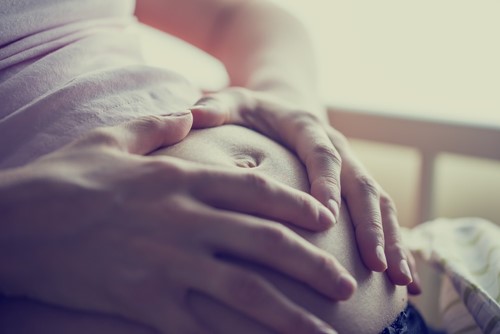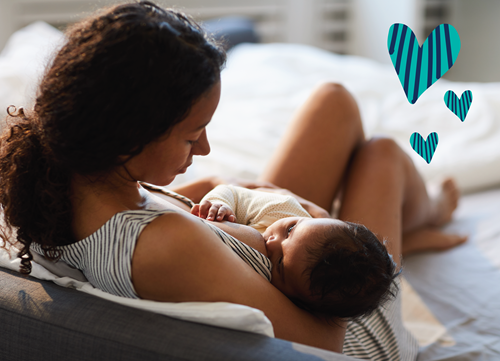Mental health in pregnancy is known as Perinatal mental health, you may never have heard of it, or known anyone who has suffered with it, but it’s so important to understand what to look out for and when to ask for help.
Mental health in pregnancy is known as Perinatal mental health, you may never have heard of it, or known anyone who has suffered with it, but it’s so important to understand what to look out for and when to ask for help.
Firstly, we all have mental health, just as we all have physical health and let me say, both are equally important! Our mental health determines how we think, feel and act and it can change depending on our life experiences, and having a baby can be one of those times.
It’s reported that 70%* of mums and mums to be will hide, or underplay maternal mental health difficulties…so why is that? Well often there can be feelings of shame associated with mums who are struggling during pregnancy and following birth. The distress of not being perfect, or not being able to cope, as well as fearing what the consequences may be, can be truly overwhelming.
I can’t tell you how often I’ve heard “I was worried my baby would be taken away from me”. Hearing that makes me incredibly sad and let me reassure you, it’s extremely rare that this happens, keeping mum and baby together is always a priority.
Perinatal mental health (PMH) or Maternal mental health is the term used to describe the impact pregnancy can have on someone’s emotional and psychological well- being both during pregnancy and for up to 2 years after giving birth. Whenever, I ask the ladies in my care what they determine ‘mental health in pregnancy’ to mean, the most common answer is the Baby-Blues, or Postnatal Depression, but the reality is, it’s so much more than that.
Whilst there is a great awareness of emotional and mental health problems that can occur after baby is
born, many don’t realise that these same feelings can happen during pregnancy too!
We’re talking conditions such as:
All of these can be identified as (PMH) - Perinatal Mental Health conditions.
1 in 5 women will experience PMH in pregnancy, or for the first year after giving birth.** So, let’s explore this important topic together, to not only raise awareness but furnish you with an abundance of information, so you can look after your own and others’ mental health, and identify when help might be needed.
It’s a good question! During your pregnancy it’s normal to alternate between happiness, tearfulness and maybe even mild irritation, with feelings of anticipation thrown in. After all, you are coming closer to a new and unknown chapter in your life with the arrival of your baby, so it’s quite understandable to have some concerns around giving birth and how you will adapt to life as a new parent. In fact, I’ve never met anyone that hasn’t felt like that, pregnancy is a big life event and let’s face it, it’s
totally life changing!
So, while some degree of stress and anxiety is normal, if you do find negative, intrusive or apprehensive thoughts and feelings are dominating, and are beginning to impact on your ability to function from day to day, then be aware this could be a sign that you are suffering with PMH.
Perinatal anxiety and depression are the two most common PMH symptoms, but unfortunately, as their early signs are often also associated with the many hormonal changes we experience during this time (yes, here they are again, those hormones!!) PMH conditions can sometimes go unrecognised…and more worryingly untreated.

One question I often get asked is what is the difference between feeling a little weepy and something more serious such as postnatal depression?
The 'Baby-Blues' presents around days 3 to 10 after giving birth, with feelings of low mood, feeling emotional and tearful. Believed to be caused by the sudden chemical and hormonal changes that happen to the body after childbirth, it usually lasts for a brief period of time and is quite manageable.
Postnatal depression usually develops within six weeks of giving birth and it can be gradual or sudden. It’s a much deeper and longer-term condition, which can range from being mild to very severe.
So, for me, I suppose it’s about self-awareness, you may find you’re unable to concentrate for long periods of time, with your mind being easily distracted. You may be eating less or find yourself totally disinterested in food. We’ve all heard the term ‘eating for 2’ but the calorie requirements only slightly increase in the 3rd trimester so if you’re eating significantly more in pregnancy, this too can be a symptom that something may not be quite right with your mental health.
Pregnancy can be uncomfortable and effect your sleep pattern, ongoing lack of sleep can negatively impact your emotional wellbeing and can worsen any conditions that you may already be experiencing. So, whilst not being able to sleep and wanting to sleep constantly can be a common pregnancy symptom, it can also be a sign that something isn’t quite right, such as antenatal depression or anxiety.
If you’re worried about a decline in your mental health, maybe answering these questions will help determine if you need to ask for help:
If you’ve agreed with any of these statements, I really would recommend you reach out to a health care professional and seek support.
Perinatal mental health conditions can have significant impacts on women and birthing people, as well as their families. Even though we don’t know exactly why they happen, there can be many reasons why they may develop. Your experience of mental health will be individual to you, just like your pregnancy experience. But if you have a history of mental health problems in the past, being pregnant or having a baby can increase the risk of them recurring and should be discussed with your doctor or gynaecologist.
It’s important to be aware that sometimes (PMH) will present with no symptoms or early warning signs, with Postpartum Psychosis for instance, there can be a sudden onset typically 3-10 days after birth with signs of delirium, hallucinations, and severe mood symptoms. It’s particularly important to be aware of this if there is a history of previous mental health issues. These symptoms do need immediate action and assessment.
I can’t stress enough that reaching out is a sign of strength, it’s a way of looking after yourself, which in turn will help take care of your baby. Let’s encourage an openness around mental health. We all need care and support, not shame and stigma!
Never be afraid to speak to your doctor or gynaecologist about any pre-existing health conditions, physical or mental. I know for me being aware of someone’s medical circumstances and support needs early on can make all the difference to the care I give. It helps me to identify when things aren’t going well, to refer on and make sure the right support is in place before it becomes an issue.
And there is so much support available from your local Mental Health Team, and also Community Mental Health Teams, especially if you have a pre-existing mental health condition.
Lara’s Tips for staying well.
- Do talk about your feelings to a friend, family member, doctor or gynaecologist.
- Do try calming breathing exercises if you feel overwhelmed, box breathing is great to put the body into a naturally relaxed state.
- Do have routine: having a little structure to your day can really help improve your mood and gives reassurance. Maybe write a daily schedule, flexible of course, and include short and simple activities that you enjoy.
- Do put some time aside to relax, no matter how brief it can really help. Even 10 mins is great!
- Do look after your physical health: Exercise or a simple walk in nature is known to improve mood and can help you sleep.
- Do look after your sleep, it affects so much and can really help recovery.
- Do eat a healthy diet with regular meals and stay hydrated: the body needs this for survival.
- Do try to attend birth preparation classes, or baby classes to meet others in a similar situation.
- Do spend as much time with your baby; it helps boost that Oxytocin, (the love and feel-good hormone).
- Don’t stop taking your usual medication when pregnant without medical consultation, it’s so important to speak to a specialist who will carry out an individual risk assessment.
- Don’t compare yourself to others. Everyone experiences pregnancy in different ways.
- Don’t be afraid to tell healthcare professionals how you are feeling, they are there to listen and to support you. Remember expert help is always available.
- Don’t think you have to be superwoman, and do it all, let others help out.
- Don’t forget partners…their Mental Health matters too.
If you’re identifying with any of the topics in this blog, or know someone who is, PLEASE take the first step and reach out to someone. My biggest hope is that you share your feelings, especially with your health care providers. With such high rates of women suffering you can see why suicide is the leading cause of maternal death in the first postnatal year, it’s so important we raise awareness.**
* Guide for integration of perinatal mental health in maternal and child health services, World health organisation, Geneva, 2022
** Strengthening perinatal mental health, Royal College of Midwives, London, 2023
*** MBRRACE-UK. Saving Lives, Improving Mothers' Care State of the Nation Surveillance Report: Surveillance findings from the UK Confidential Enquiries into Maternal Deaths 2019-21. Oxford: National Perinatal Epidemiology Unit, University of Oxford 2023.
If you, or someone you know is struggling...or just needs to talk things through, visit us at Lil-Lets Talk.
Lil-Lets Talk